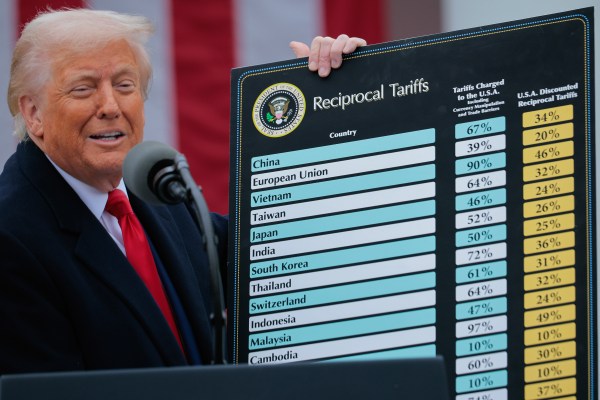Dear Reader (even the photobombers),
I’ve seen a lot of attempts to find an analogy for the moment we’re in. Some are pretty literal—Smoot-Hawley and all that. Some are more figurative. A few friends have likened it to 9/11 in that it is just an epochal chapter break. Everyone I know who was an adult back then still sees the past in terms of pre-9/11 and post-9/11. Likewise, if Donald Trump doesn’t back off soon, or if Congress doesn’t grow a spine and stop him, then it does seem pretty clear that we will be talking about BLD and ALD—Before Liberation Day and After Liberation Day—for the rest of our lives. That’s true if it’s a success or if it’s a failure.
I’m struggling to follow wise counsel and not look at my stock portfolio or retirement account. I haven’t yet, because I know what it will be like. In fact, Steven Spielberg did me the courtesy of visualizing my struggle. The kid from Poltergeist is me trying not to look at the clown show, as it were.
At least I have my I-told-you-so’s to keep me going. But I am fascinated with how the various pro-Trump factions are processing all of this, because I know what it feels like to be proven wrong by reality. I remember when it was becoming impossible to deny that the U.S. military would not in fact find the robust stockpiles of weapons of mass destruction the Bush administration used as the primary justification for the invasion of Iraq. I was always skeptical of emphasizing that rationale, but I also wanted it to be vindicated because it would make everything easier. It wasn’t vindicated, then the war itself started to go very badly.
It felt terrible for all sorts of reasons. First and foremost, it felt terrible because it was a terrible thing for America, American forces, our allies, and Iraqis. But being on the wrong side of something so important that I supported felt terrible. It’s not like things would have gone differently if I had opposed the war from the start. I spent years fighting with people whom I believed to be wrong on the facts and in their analysis of them. I convinced myself—sometimes correctly, sometimes incorrectly—that they were willing villains in the morality tale of the decade. So, to then watch as events unfolded in ways that supported their views and contradicted mine was a pretty miserable experience. I should say that I don’t think the other side always had the better arguments, given what we knew then, or even now. Iraq wasn’t a “war for oil” or any of that stuff. Indeed, that’s one of the things that made the period so excruciating. People who made bad arguments were being politically vindicated.
I bring all of that up because I know lots of people have convinced themselves that Donald Trump and J.D. Vance are right: that their version of economic history is accurate and their prescriptions for how to fix our problems are the best remedies possible. I also know a bunch of people who have always known in their hearts that Trump’s mercantilist hornswaggle is unsound, but who lacked the courage to say so. And, of course, plenty of people merely suspect Trump is wrong but hope he’s right and are eager to be proven wrong. There were people across the right—and a few on the left—who fell into similar places with regard to George W. Bush and the Iraq war.
Anyway, that’s why I find watching the MAGA right go through an extended Kübler-Ross “Five Stages of Grief” process so fascinating. Many are still in denial and anger. Even more are literally and figuratively in the bargaining phase, by which I mean they are still clinging to the idea that Trump is doing all of this as a negotiating tactic and he’ll find some “deal” that will have made it all worth it. The folks in the depression stage are hard to find, because they’re the least likely to do TV interviews. I haven’t seen much acceptance yet, though I think it’s more than a little intriguing that the Heritage Foundation’s trade guy is already singing a different tune than he was a few weeks ago.
I’m glad to be on the right side of this argument. As terrible as it feels to watch my net worth plummet and to watch my country undergo the single most egregious deliberate act of economic self-harm perhaps in its history, at least I’m not being proven wrong in the process. My hopes aren’t being dashed, my views aren’t being discredited in real time the way Vance’s are and will continue to be. That may sound smug, but the more that offends you, the more likely it is that you’re feeling defensive about supporting a terrible policy and even worse implementation of it.
Making the case.
Still, I keep hearing from decent people who desperately want Donald Trump to be right about this or who think we should just give this a shot.
These encounters, whether via email and Twitter or in person at airports, are exhaustingly frustrating because the arguments they bring have an air of desperation. Many people accept Trump’s baseline premises. They believe that the economic era since NAFTA has been a disaster for America, hollowing out the middle class and that, therefore, something has to be done to fix it. (For what it’s worth, a lot of that “hollowing-out” is due to the fact that a lot of middle-class people got richer, not poorer).
From there they insist that at least Trump’s goal is right—we should have an industrial policy of some kind that “brings back” manufacturing. Then these folks insist the onus is on me to provide a better strategy to achieve that goal. At least he’s trying something! All you’re doing is criticizing! What’s your plan?
I don’t have one, largely because I don’t feel like I need one. Trump is not alone in inventing this “crisis” (he’s just the most important and consequential author). But it is a bogus, manufactured crisis (economically, politically, legally, and constitutionally). The presumption that I must have my own plan to deal with a crisis I don’t think exists is a coping mechanism. I think NAFTA was good (for many of the reasons the Heritage Foundation laid out in the Before Times), but I also think it wasn’t that big a deal. The transformations to our economy that transpired after its passage would largely have happened anyway. Here’s something worth keeping in mind: Back in 2018, amid Trump’s first foray into tariffs, George Will wrote:
All this dictating and renegotiating is supposed to protect American jobs from the menace of NAFTA, which according to one of its ardent critics destroyed 1 million U.S. jobs in its first 20 years (1994–2014). An academic study argues that trade with China destroyed 2.4 million jobs between 1999 and 2011. But Don Boudreaux of George Mason University’s Mercatus Center says this means it took NAFTA two decades to destroy as many jobs as are erased by the normal churning of the American job market on average every 18 days. And the so-called “China shock” eliminated in 13 years as many jobs as are eliminated by the U.S. economy’s process of creative destruction, on average, every 41 days. So, if there are to be trade “wars” with China and Mexico, they will be launched to avenge job “casualties” that are far fewer than those routinely inflicted by the domestic processes that produce American prosperity.
If you want me to offer ideas about how we can do better at manufacturing chips or building ships, or to contain China, I’m happy to think about that or have that conversation. But you’re not going to get me to agree that because we should do those things, declaring economic war on Mexico, Canada, Japan, the EU, and the U.K. makes sense. You won’t convince me we need to save manufacturing by making bananas and avocados more expensive. Nor will you get me to say, “at least he’s trying.”
I’m astounded that people will repeat Trump’s talking points back to me as if they are good faith, accurate, and often irrefutable descriptions of reality. They insist that our friendly trading partners have brilliantly used tariffs to prosper at our expense but can provide no examples that hold up to scrutiny. They claim that draconian tariffs will force corporations to bring back manufacturing to the United States. And because everyone simply agrees to believe that “manufacturing jobs” are definitionally synonymous with “middle class wages,” they think being opposed to more manufacturing jobs is being opposed to more Americans being able to live in Ozzie and Harriet-style prosperity. Nostalgia, Robert Nisbet once said, is the “rust of memory.” These fantasies about bringing back the Rust Belt are the economics of nostalgia.
Meanwhile, to listen to some of the more strident populists, you’d think that rich “elites” have shipped away these good jobs to Third World countries just so they can have cheap sneakers or inexpensive avocado toast. It never seems to occur to them that rich elites can afford more expensive sneakers and avocado toast. A closely related assumption is that poor and middle-class people don’t care as much about having cheap sneakers and avocados (also used in guacamole, by the way, at the sort of football-watching parties that these real Americans reportedly enjoy so much). Treasury Secretary Scott Bessent mocks the idea that the American dream involves having access to cheap goods. Talk about elitism.
But if you take your partisan blinders off for a nanosecond it is obvious that Americans with more constrained incomes spend a greater share of their disposable income on things like shoes or food than rich people do. I’ll keep the math easy. If you make, say, $100,000 per year, spending $1,000 a year on shoes for you and your family is 1 percent of pretax income. If you make a million dollars per year, spending the same amount is 0.1 percent of your income. Please feel free to check my work.
In this sense, shoes are 10 times more expensive for the middle-class person than the rich person.
In other words, the poorer you are, the more you benefit from “cheap goods.”
Look, I’ll be honest: I’m getting tired of talking about trade. It’s nothing like my specialty or expertise. I’d much rather be talking about women’s prison movies. But I feel the need to explain, as plainly as I can, why I think the people yelling at me don’t really understand the facts.
The fable of the shoes.
The late economist Murray Rothbard once offered a useful thought experiment. What if everyone had always gotten their shoes from the government, but then one day someone suggested that we privatize the shoe business? How could the private sector handle all the different sizes? Who would decide where to put the stores? Etc.
The Liberation Day crowd has a similar fable. They don’t want to get the government into the business of making shoes, they just want the government to make Americans buy shoes made in America because that would be “better.” Okay, so let’s think that through.
Let’s say you run a sneaker factory in Vietnam. Let’s just say for the sake of argument that semi-skilled workers there make $500 per month, which seems to be a bit high but in the ballpark. That’s $6,000 per year, working pretty long and difficult days. Looking at its website, Nike sells shoes in the U.S. from a high of $285 (the Alphafly 3) to a low of $55 (the Vapor Shark 3 football cleats). I’m excluding the cheaper sandals.
(Author’s note: When I looked at their website yesterday, the price was $47. When my editor checked this afternoon, the price had gone up to $55. That’s a 17 percent increase overnight.)
Now, the stated goal of the Trump administration is to get Nike to move factories to the United States. Give those good, high-paying jobs to Americans, dammit. Vietnam’s per capita GDP is $4,904 (that’s the highest estimate from the International Monetary Fund. The U.N.’s is $4,282). So, $6,000 is nothing to sneeze at. Do you know anybody, outside of kids with after-school jobs, who thinks $6,000 a year is a living wage in the United States? The per capita GDP of the United States ranges from just over $80,000 to just below $90,000.
I am totally open to looking at other metrics, like Purchasing Power Parity per capita, or median income. The numbers change, but for our purposes, the ratios really don’t. An American worker might be able to live on an average Vietnamese worker’s income—in Vietnam. In the U.S. they would struggle to do better than mere subsistence as a homeless person or a charity case.
So, assuming it’s even possible, what happens when the sneaker factory is moved to America? Well, the federal minimum wage is $7.25 per hour. That’s $15,080 per year or $1,256.67 per month. So, the lowest paid American worker costs at least twice as much as a fairly well-paid Vietnamese worker. You can tack on a few more thousand dollars per year if you want, since these numbers reflect a 40-hour work week, and Vietnamese factory workers often work much longer than that.
But you get the point. This isn’t the stuff of good, middle-class American wages.
Let’s assume that Donald Trump can make Nike pay good American wages. Depending on where you live, middle-class wages are somewhere between $66,000 and just under $200,000 per year. So, the low end of that—$66,000—is 11 times the Vietnamese factory worker’s salary. Even if you hold everything else constant—access to raw materials, supply chains, worker regulations, etc.—labor costs for sneakers would be 1,100 percent greater in the U.S. Labor accounts for about 25 percent of the cost of a shoe (that’s in China, but let’s assume it’s similar for neighboring Vietnam). And it costs Nike $28 to make a shoe that retails for $100. So now, instead of $7 of labor per shoe, a $66,000-a-year factory worker makes that slice of the pie cost $77.
So you, sneaker factory owner, have three choices. You can pass those costs on to the consumer, you can eat those costs and go out of business, or you can invest in robots to make those sneakers more cheaply.
Now, I don’t know what sneaker-making-robots cost, assuming they exist. But let’s say they do. I also assume they cost more than what it costs to have Vietnamese workers make sneakers. Why? Because if robots could do the job much more cost effectively than Vietnamese workers, Nike would invest in said robots. It has not done so to date. That suggests that even if you could acquire such robots, the costs for making sneakers would still be greater than the cost of using Vietnamese humans. That means it would undoubtedly be more expensive than using American humans. Which is not to say that a few people wouldn’t make actual middle-class wages operating and maintaining the robots.
In other words, if Trump’s Liberation Day plans are wildly successful, American consumers will get to buy much more expensive sneakers in exchange for a handful of good jobs running sneaker-making robots. That sounds like a really stupid trade-off.
Oh, there’s an added expense that is more difficult to quantify: This dynamic will apply to electronics, clothes, auto parts, and other goods Vietnam produces. So by following through on this plan, we will have dealt a devastating blow to Vietnam’s economy, which will make any chance of pulling Vietnam out of China’s economic and strategic orbit infinitely more difficult. Why should the Vietnamese believe they are better off aligning with us, when aligning with us has led to this?
So there you have it. That’s one facet of why I think what Trump is doing is so stupid. It’s stupid not just because it won’t work, it’s stupid because if it did “work” we’d be worse off.
And I feel no obligation to save you from your Kübler-Ross spiral by offering my “better plan” for doing something I don’t think we should do.
Various & Sundry
Canine Update: So the other day I was driving home from CNN or my lambada lessons—I can’t remember which—and I turned onto a street a couple blocks from where I live, and there was Chester walking across the street like the biggest guy in the prison yard. I’m starting to think that my house is just the first shakedown of a whole circuit. Pippa is doing fine, but she has not liked the sky booms of late. But she’s very happy that we’ve now entered bluebell season and spaniel weather generally. She’s also being very demanding on non-sky boom mornings. She insists more and more on belly rubs before going for the morning walk, which causes Zoë to demand less mollycoddling of the spaniel. This then wakes up TFJ. Zoë is demanding in other ways, too. The small dog posse is getting pretty arrogant, but only a select few qualify for Zoë and the Aroogulas.
The Dispawtch

Owner’s Name: Pedro Diaz
Why I’m a Dispatch Member: I’ve always had respect and appreciation for both Mr. Hayes’ and Mr. Goldberg’s insights and opinions. Mr. Hayes especially, for he wisely chose Madrid for his sabbatical with the family and also developed an appreciation for the amazing wines of Spain while there. (Honorable mention to Jonah for his cigar habit, which is also in my wheelhouse).
Personal Details: I’m American of Cuban origin. I grew up in Miami but went off to graduate school and lived all over (including Spain) for the past 40-plus years (which I guess makes me not a “Miami Cuban”). Now back in the much transformed, international and booming city Miami has become.
Pet’s Name: Riggs
Pet’s Breed: Saint Bernard
Pet’s Age: 9
Gotcha Story: I found myself randomly looking at rescue sites and spotted him. He was some 25 pounds bigger than our prior Saint (who was a small 90 pounds and passed at the ripe old age of 14), but that wasn’t that much (or so I thought). We drove some six hours to see him in Michigan (Go Blue!). He barked at us, was much bigger than we thought, and smelled like a fish market from a severe dental infection. Nonetheless we signed the papers and dragged him home to Ohio, where we lived at the time.
Pet’s Likes: Air conditioning (we’re in Miami now). Car rides. More car rides. Sofas. Being a lap dog. Naps. More naps. Mickey D’s soft ice cream cones. Cuban croquetas.
Pet’s Dislikes: Big dogs (the irony!). Men carrying big and/or noisy things. Ohio State football … actually Ohio State anything.
Pet’s Proudest Moment: He became fluent in both Spanish and Miami Spanglish in no time (having a totally different cuisine to motivate him helped greatly).
Bad Pet: We rescued him when he was 5 and he had been very well trained by his prior family. In fact, folk in South Florida rarely see Saint Bernards and constantly, sometimes wantonly, approach him and praise, hug, squeeze him (I think they’re crazy, given his size), and he’s never reacted in a negative way. But there was the one lady with the yappy Chihuahua (redundant, I know) that barked at him constantly who blamed him for existing.
Do you have a quadruped you’d like to nominate for Dispawtcher of the Week and catapult to stardom? Let us know about your pet by clicking here. Reminder: You must be a Dispatch member to participate.










Please note that we at The Dispatch hold ourselves, our work, and our commenters to a higher standard than other places on the internet. We welcome comments that foster genuine debate or discussion—including comments critical of us or our work—but responses that include ad hominem attacks on fellow Dispatch members or are intended to stoke fear and anger may be moderated.
With your membership, you only have the ability to comment on The Morning Dispatch articles. Consider upgrading to join the conversation everywhere.